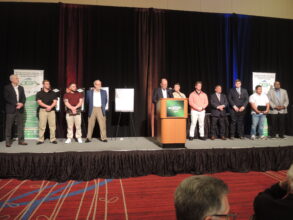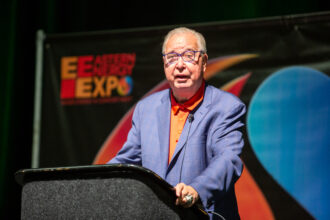Biodiesel’s Future is Focus of Conference
Michael Ferrante appeared on a panel at the National Biodiesel Conference & Expo in San Diego, talking about passage of alternative portfolio credit regulations in Massachusetts.
“Those are regulations that allow retailers to get a credit for blending biodiesel and selling it,” said Ferrante, president of the Massachusetts Energy Marketers Association, based in Burlington, Mass. The association lobbied for passage of the regulations. “I basically summarized how we built coalitions and worked with the state” for passage of legislation establishing the credit regulation, Ferrante told Fuel Oil News in a phone interview after the conference, which was held Jan. 21-24.
Today approximately 30 fuel retailing companies in Massachusetts are registered participants in the credit program and are selling biodiesel blends—B10 or higher. Most are selling B20, Ferrante said. “There are some that are selling beyond that.” B10 is the minimum blend for which retailers can earn the credit. “It’s successful, it’s growing,” Ferrante said of the program. “More retailers will take part in it as they get to understand the program more fully and work with their suppliers to get biodiesel,” he predicted.
The National Biodiesel Conference & Expo closed with a promise to “fuel the future with biodiesel,” said the event organizers, the National Biodiesel Board.
One of the main goals of the conference is to educate attendees on all things biodiesel and biodiesel-related. One of the educational sessions was “Biodiesel 101,” which gave attendees the basics they needed to know about the biodiesel industry.
NBB also hosted sessions on educating the consumer, such as “Riding for the Brand,” a session designed to share how biodiesel companies can help “America’s Advanced Biofuel” stand out in a growing field of options for consumers.
Made from a diverse mix of resources such as recycled cooking oil, soybean oil and animal fats, biodiesel is a renewable, clean-burning diesel replacement that can be used in existing diesel engines without modification. It is a domestically produced, commercially available advanced biofuel. NBB is the U.S. trade association representing the entire biodiesel value chain, including producers, feedstock suppliers, and fuel distributors, as well as the U.S. renewable diesel industry.
While there is still policy uncertainty, biodiesel experts from across the country shared insights to help attendees navigate expectations for the coming years. A focus for many biodiesel leaders is federal and state policy, and the impacts they are making in the industry. “It has always been NBB’s strategy to help establish state and regional policies to complement the federal policies that shape our industry’s market,” says NBB CEO Donnell Rehagen.
During the conference, NBB covered policy bases and shared updated information on the industry’s outlook for 2019. The Renewable Fuel Standard, trade, tax incentives, low-carbon fuel policies, and Minnesota’s B20 state standard were amongst topics covered.
“Showing our strength, getting down in the trenches and fighting, and securing the support of Congressional allies will continue to be the keys to success,” said Kurt Kovarik, NBB vice president of federal affairs.
More than 800 biodiesel producers, distributors, retailers, and other industry advocates gathered for the conference.
Each year the “Next Generation Scientists for Biodiesel” program offers scholarships to college students for an opportunity to participate alongside other industry experts at the conference. The program is intended to foster professional relationships between budding and established scientists, share accurate information, and increase collaboration with academia and the biodiesel industry. At this year’s conference, scholarship winners had the opportunity to share their extensive biodiesel research during a poster session and held a breakout session, “One Small Step: The Next Generation of Biodiesel Scientists,” to share their key findings and industry breakthroughs.
“The National Biodiesel Conference is a highlight because I get to meet industry experts, hear about key biodiesel issues, and gain a better understanding of the industry dynamics,” said Shyam Paudel, NGSB Co-Chair and student of Missouri University of Science and Technology. “I got the opportunity to present my research and validate my hypothesis by talking to chemists, plant managers, and other biodiesel leaders. Through conversation, I gained insights into the biodiesel supply chain and how policy like the biodiesel tax credit affects the market.”
At the conference. a goal is to promote and advance biodiesel use through sustainable initiatives and practices. Integral sessions discussed how biodiesel companies can commit to the reduction of greenhouse gas emissions and advance affordable, domestic renewable fuels.
In the final session, “To 2022 and Beyond: Renewable Fuels in the Next Decade,” renewable fuel industry leaders discussed the Renewable Fuel Standard and what is on the horizon for 2020.
“Opponents of the RFS early on thought that sustainability might be a weakness to exploit. We knew that was wrong, that science was on our side—but we hadn’t galvanized biodiesel’s sustainability story with the data, research, and scientific thought leaders we needed to counter our opponents’ emotion-based attacks,” said Rehagen, NBB’s CEO. “We knew the bombs hurled at biodiesel had little to do with actual facts, but we had to have more than that to defend our fuel.”
Along with Rehagen, guest speakers for the session included Emily Skor, Growth Energy chief executive officer; Geoff Cooper, Renewable Fuels Association president and CEO; and Doug Whitehead National Biodiesel Board chief operations officer.
For more information on the National Biodiesel Conference, please visit www.biodieselconference.org.
PICTURED FROM LEFT: Moderator Shelby Neal, National Biodiesel Board; Michael Ferrante, Massachusetts Energy Marketers Association; Rebecca Richardson, National Biodiesel Board; Grant Kimberley, Iowa Biodiesel Board. Photo courtesy of NBB.
This article is based on a news release issued by the National Biodiesel Board, with additional reporting by Stephen Bennett.




